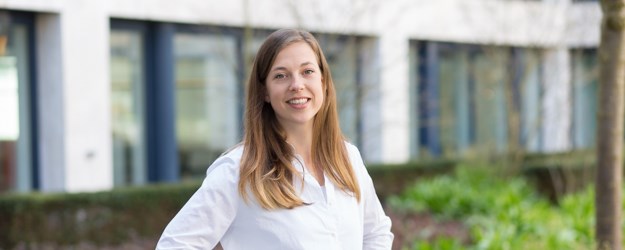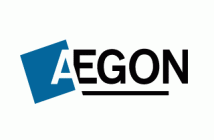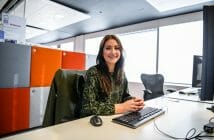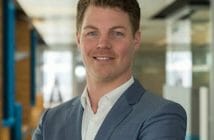The magazine ‘The Estimator’ interviewed Welmoed Kuperus, data analytics trainee at Aegon. Read about her experiences at Aegon and how she ended up there in this interview.
What did you study?
‘First, I did a bachelor in Criminology, in which I got trained to be a social science researcher. I did my first master in Public Administration at Erasmus University, but it was not a perfect fit for me. My thesis was about Human Resource Analytics, which I wrote while working at the Dutch interior ministry. During this time, I learned a lot about data science and data analytics. Hence, I decided to start another master, namely the master Data Science at Tilburg University. This master provided the link between the difficult programming and the business aspect of data analytics. My thesis for this master was about text mining, which I used to predict whether emails contain one or multiple lies or not. Via a recruitment event, I signed up for an inhouse day at Aegon. I liked the company and its business so much, that I decided to apply for the traineeship I am currently doing.’
How does this traineeship exactly work?
‘This traineeship is called the International Aegon Analytical Academy (IAAA) and lasts for three years. The goal of the traineeship is to develop yourself in four broad areas: first of all, in the area of data and technology, in which one will learn how the right sets of data can be extracted from a database and how to process these data. Secondly, one will learn the techniques and methods to analyse the data, like the financial risk models and marketing models. Thirdly, the trainee will learn how a real impact can be made using the findings of the research. Last but not least, one will acquire a lot knowledge about the financial world, especially financial analytics.
In the three years, one will start off with a bootcamp that lasts 6 weeks, and after that, a couple of training modules and projects can be chosen. The group of trainees is international, so one can choose to do a project abroad, at one of Aegon’s other locations, like Brazil, Singapore, Spain, the US, et cetera. One also needs to do two internships, of which one is in the Netherlands, and another one abroad. In this way, Aegon tries to create a link between all international analysts.
Of course, everyone who signs up to do this traineeship, is on a different level in a different field. Also, everyone has different goals and places where he/she wants to be. The coaching part that comes with the programme helps one to create the possibilities to reach one’s goals. I, myself, do not exactly know yet what I want to do within this company in the field of data analytics, so I use this time to try as many different things as possible in order to find out what I like best.’
Where do these people participating in this traineeship end up?
‘Aegon is a huge international organisation, so one builds up a network quite easily. Hence, the possibilities are infinite, given the fact that one is motivated and willing to work for a goal. Some of my colleagues prefer to stay working at the same place they do now, but others are very interested in going abroad to work at an Aegon office there.’
Can you explain what Aegon exactly does as an organisation?
‘Aegon is an insurance company, a pension fund, and provides mortgages. Moreover, Aegon has a bank called ‘Knab’. In the Netherlands, we do not provide health insurances, but for instance in Spain, the health insurances are our biggest products. In Asia, we mainly provide our services online, namely through websites.’
Do you still use the quantitative models you learned in your Master?
‘Yes, I still use these models. For instance, I am currently working on a price-elasticity model, for which I need to do a lot of complicated programming. Eventually, the goal of this model is to optimise the price, so that requires a lot of skills I learned during my Master. However, I sometimes just use very simple data and models, which do not really require any advanced skills. Personally, I like the balance between the two. In the traineeship, one learns these advanced skills in the field of statistics and programming, but also how to interpret and translate these outcomes to make them understandable for everyone in the company. In this way, we are the link between the data and the rest of the company, and in this way, we definitely have impact.’
What is the most interesting project you did so far?
‘I am currently working on a project about late payments, in which I am trying to figure out why people do not pay and how we can help these people with their financial situation. With a simple analysis, we can determine when these late payments are developed, which factors play a role in the development of late payments and how many letters needs to be sent in order to make people aware of their late payments. A business owner will help me make the impact when I have my results, which is very exciting.’
What is working at Aegon like?
‘My colleagues are all quite young: everyone is either still doing their traineeship or has just finished it. Many drinks and trips are organised, which makes it a lot of fun to work for Aegon. Moreover, most of the time, we stay a little bit longer at the destination of our week of training in order to see the city and enjoy our time there. We also work out a lot with out colleagues. Some of my colleagues are training together for a half marathon, but I am currently training for a mini-triathlon with another group of colleagues.’
What kind of students are you looking for?
‘The students need to like doing data analyses, of course. Also, they should be enthusiastic and willing to develop their skills in a fast pace, and have the energy and motivation to succeed in doing this traineeship for three years. We are looking for someone who possesses the mix of technical skills and the willingness to make a serious impact in the business.’
What kind of studies did your fellow trainees do?
‘Most of them are econometricians, mathematicians and physicists. Only a few come from the social sciences, like me. In foreign countries, most of the people are actuaries and people who studied statistics. The wide variety of study backgrounds makes discussions very interesting, as everyone has a different perspective on problems we face.’
Do you have any advice for the current students who are reading this?
‘Please join us for an inhouse day, because you will really get an idea what working for Aegon is like. Moreover, you can just send a mail to us to ask some burning questions. We are open to getting to know you as well. Moreover, if you’re not sure yet what you want to do as an econometrician, choose a job in which you still have all the possibilities to grow in whatever field seems interesting to you.’





